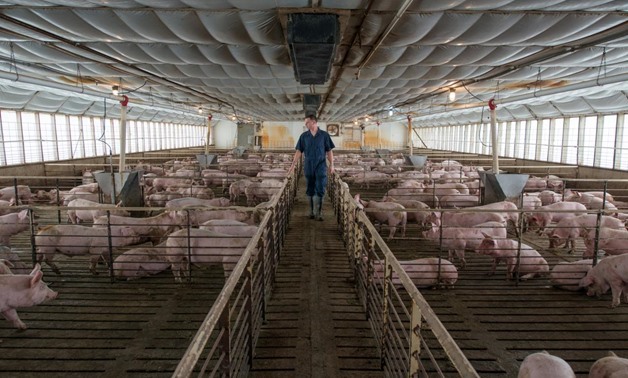
Pigs are seen at a Smithfield Foods, the world's largest pork producer, farm in the United States in this image released on April 11, 2017.
CAIRO – 15 July 2018: Raising pigs in Egypt has encountered criticism as being a source of environmental pollution, though their keepers totally believe the opposite, as the pigs help reduce garbage pollution in streets.
Isaac Michael, director of the Society for the Development of Community and a pig breeder, told Egypt Today on Saturday that the pig keepers are currently preparing to rebreed pigs in order to reduce garbage.
In 2009, the government in Egypt ordered hundreds of thousands of pigs killed, fearing swine flu because some parliamentarians of the Muslim Brotherhood within former President Hosni Mubarak’s regime resorted to ridding the nation “from an animal held as offensive to Islam” and an estimated 300,000 pigs were confiscated and killed, Michael said.
Egypt Today had earlier made a visit to Meit Okba pig farms in Giza, where most of the area consists of garbage dumps, where pigs are fed. In addition, some garbage collectors work filtering the garbage and they live off the pigs.
“Thousands of garbage collectors live off filtering garbage and keeping pigs in the Mu’tamediyya district, Giza, while many others work in different areas in Giza and Cairo,” Ahmed Abdul Samie, one of the pig keepers, told Egypt Today.
Abdul Samie added that the number of pig-keepers has decreased since 2009, when the state executed a massive number of pigs in the wake of swine flu in 2009 in Egypt.
In 2009, Egypt began a mass slaughter of thousands of pigs in an effort to prevent swine flu spreading, BBC reported.
"It is decided to slaughter all swine herds present in Egypt, starting from today," said Health Minister Hatem el-Gabali, according to MENA news agency.
Giza Deputy Governor for Districts Affairs Alaa Al-Harras said that the governorate has no problem as a result of keeping pigs, adding, “We leave them free,” and the governorate has not submitted a proposal for moving their farms.
In the same context, the chief of the Health Department in Giza governorate said that the H1N1 swine flu has not existed for a few years, adding that there were no recent cases of the virus, which is linked to pigs.
“Pork helps reduce demand on beef, as fighting pig-keeping is one of the main reasons for beef prices hiking,” Shehata al-Mukaddas, chief of the garbagemen and a pig-keeper, told Egypt Today.
Pork is widely eaten by Christians, foreigners and tourists in Egypt, which is a Muslim-majority country.
For Muslims, Pork is ruled as “haram” (forbidden) and it is not permissible for Muslims to eat it, whether it is the meat, fat or any other part, as instructed by the Quran.


Comments
Leave a Comment